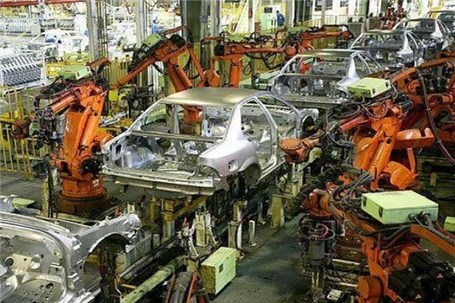Pakistan-Iran cooperation in auto sector discussed
Asre Khodro: Iran's Ambassador to Pakistan Mehdi Honardoust and Pakistan Automotive Manufacturers Association (PAMA) Chairman Sohail Bashir Rana on Saturday exchanged views on cooperation between the two countries in auto sector.
يکشنبه ۱۴ شهريور ۱۳۹۵ - ۱۰:۱۷:۰۰
Reporting "Asre Khodro", Honardoust on the occasion termed role of the auto industry in increasing trade cooperation between Iran and Pakistan as very important, especially in post-JCPOA era, and underlined the need for preparing ground for more cooperation between companies in the auto manufacturing as well as spare parts production, an Iranian news agency reported.
Referring to Pakistan’s past cooperation with the Iranian companies in tractor manufacturing and engine building, Rana called on key auto-manufacturers and the Iranian envoy to support return of the era of cooperation between the two countries.
The ambassador expressed embassy's readiness for every kind of support and assistance in facilitating coordination between different related sectors in both the countries.
, and added that markets in the two countries could prove to be an appropriate breeding ground for joint ventures in different sectors of auto manufacturing.
FPCCI pleased with govt efforts for growth of Islamic financing
ISLAMABAD (INP): The Federation of Pakistan Chambers of Commerce and Industry (FPCCI) on Saturday expressed satisfaction over efforts of the government aimed at rapid growth of Islamic financial industry.
“The Islamic banks should also focus on microfinance market to lift people out of poverty,” said FPCCI President Abdur Rauf Alam.
He said that over 2000 institutions were providing Islamic financial products globally, while the volume of this sector, which had been projected to hit $3.
5 to $4.
0 trillion in five years, had already crossed $2.
4 trillion.
Alam said that Saudi Arabia, Malaysia and Iran were leading the Islamic finance sector, having over 65 percent assets, while Malaysia was world leader in Sukuk market.
“Pakistan has also witnessed rapid expansion of Islamic financial market, as we had the first Islamic bank in 2002, while now 22 Islamic banks were operating,” he said, and added, “At the same time, the interest of conventional banks in Islamic financing continues to increase.
”
The FPCCI president said that Islamic banks were developing at a rapid pace of 200 to 250 percent per annum, and they had captured almost 50 percent of the consumer market.
“But most of the institutions overlook microfinance despite having over Rs1.
74 trillion in deposits,” he said.
He further said that banking was the leading sector in Islamic financing, making up almost 80 percent of the entire system, while insurance came next.
Railway tracks to be upgraded countrywide under CPEC
ISLAMABAD (APP): The Ministry of Railways will upgrade its existing tracks besides installing new railway tracks from Gwadar-Quetta-Jacobabad via Besima Tehsil in Balochistan, under China-Pak-Economic Corridor (CPEC).
Under the project, a total 560 kilometres track from Bostan-Kotla Jam on the main line-II via Zhob and Dera Ismail Khan and another 682 kilometres track from Havelian to Khunjerab will be laid, a source in the Ministry of Railways told APP.
The upgradation of 1,872 kilometres track from Karachi to Peshawar via Kotri, Multan, Lahore and Rawalpindi (including Taxila-Havelian) - along with dualization of the track from Shahdara to Peshawar will also be carried out.
To enhance connectivity and improve transportation facilities, 1,254 kilometres of railway track from Kotri to Attock City via Dadu, Larkana, Jacobabad, Dera Ghazi Khan, Bhakkar and Kundian will be upgraded.
The CPEC is a 3,000-kilometer network of roads, railways and pipelines to transport oil and gas from Gwadar Port to Kashgar city, Northwestern China's Xinjiang Uygur autonomous region.
An official agreement on the corridor was signed between the two countries in May last year during Chinese President's historic visit to Pakistan.
The project links China's strategy to develop its western region with Pakistan's focus on boosting its economy, including the infrastructure construction of Gwadar Port, together with some energy cooperation and investment programmes.
It also involves road and railway construction including the upgradation of 1,300-km Karakoram Highway, the highest paved international road in the world which connects China and Pakistan across the Karakoram mountains.
The CPEC will reduce China's routes of oil and gas imports from Africa and the Middle East by thousands of kilometers, making Gwadar a potentially vital link in China's supply chain.
NARC to assist farmers for cultivating soyabean
ISLAMABAD (APP): NARC would provide technical assistance to farmers of Chakwal region to cultivate soyabean over 1,200 acres of land in order to enhance oil seed production in the country.
The main objective of the imitative was to enhance the farm income of small land holders to alleviate poverty, besides strengthening the domestic oil seed production.
An official of the Council said the recent campaign was started in collaboration with different international partner agencies and development partners.
He said it would also help to enhance domestic oil seed production and production of edible oil and reducing the import bill of the country.
He said that PARC and NARC was also providing information to farmers of remote areas regarding use of modern technology which was vital for development of agriculture sector and betterment of farmers.
PARC scientists, he said was determined to make the country self-sufficient in agriculture production by providing new technologies to the farmers particularly to small farm holdings, he added.
He also highlighted the different programmes and projects initiated by the PARC for the development of agriculture and livestock sectors of the country.
The PARC, he said, would also provide full support and technical assistance to formers of the region in adoptions of new technologies of cultivation and crop management to increase the production of peanut, nuts, mash, mustard, canola and soyabean, he added.
Source: nation.com.pk

